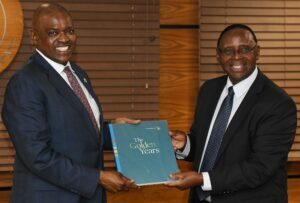Panelists Fatma Karume, Senior Partner IMMMA Advocates, and Mutuma Mathiu, Group Editorial Director, Nation Media Group, during discussion on Media and the Great Democracy Race, at the KUSI Ideas Festival at Intare Conference Arena in Kigali, Rwanda on December 09, 2019. Media was challenged to increasing engage the youth in a personalised way on climate change, conservation and creative arts. PHOTO | JARED NYATAYA | NATION MEDIA GROUP
The mainstream media of the future will be required to constantly invest in digital platforms in order to reach a more discerning clientele.
Panelists at the Kusi Ideas Festival in Kigali, Rwanda said the media landscape was changing first with Artificial Intelligence allowing computers to generate media content.
The Internet of Things would is also increasingly enabling consumers to receive news through appliances like fridges and cookers.
“As it is, the use of specific devices to receive news is in its last stages, people will receive news from their fridges and all manner of gadgets,” Nation Media Group Editorial Director Mutuma Mathiu said.
Converged technology, he added, was good for journalism in terms of truth-seeking, fact-checking, and storytelling.
He described social media as a double edged sword – mobilising people while spreading fake news – leaving mainstream media with the traditional value of keeping the citizenry informed.
“We have seen social media being weaponised to rig elections and spread mis-information. Now we’re seeing people preferring to pay for credible news,” Mr. Mathiu said.
He hoped that media will “continue to talk the truth to power and hold the leaders to account” irrespective of its form, he told a session themed Media and the Great Democracy Race.
Democracy
Monari Moshoeshe, the Deputy managing director at Times Media, said mainstream media had lost its role as the sole agenda setter. “The one dimensional communication will no longer make sense. The power will be returned to the people, people will be expressing themselves – in terms of democracy,” Mr. Moshoehse said.
Jeanine Munyeshuli said the landscaped had tilted allowing social media to have a larger say in democracy.
“Social media is here to stay and to participate in democracy,” she said, adding that governments can no longer keep things under the carpet.
Aggrey Oriwo, the managing director of Ipsos Kenya said that media is now headed for personalized consumption as individual derive wider choice from increased connectivity.
“We shall be only speaking to these people in the language they understand,” Mr. Oriwo said.
Fatuma Karume, senior partner at IMMMA Advocates social media was more powerful than the traditional printing press which was key to the steady spread of democracy.
“It (social media) completely democratized media. It is the people deciding their conversations and how they want to have it,” Ms. Karume said.
Social media, she said, had an “incredible impact” on democracy even for outside the voting age.
“Someone who is under 18-years of age can express their opinion. They can tag the president, prime minister and the conversation starts,” she said.
Conservation
While governments can keep tabs on social media, the realities now meant ‘the guns can no longer stop people from expressing their views.”
Climate change, conservation and creative arts are among the areas the media should increasingly engage the youth on.
“We need to support young people’s ideas in the circular economy especially in the area of utilizing waste like broken glass, recyclable home waste and plastics. This will save forests. We need to highlight their initiatives so that we push this agenda across board,” Ikal Angelei, the Director of Friends of Lake Turkana.
Francis Okomo-Okello, Chairman TPS Eastern Africa Plc challenged the youth to use creative arts in communicating climate change in ways that were easily understood.
“The future is here. Music would be a very powerful tool in illustrating the impact and potential of climate change,” Mr Okomo-Okello said.
He said industries should offer real value to communities through initiatives such adequate compensation for land and support for urban poor.
“We need to support the urban poor, especially women, who are facing challenges around getting fuel and managing waste. Supporting informal regional supply chains will help break barriers imposed by big business or cartel economies,” Mr Okomo-Okello.




